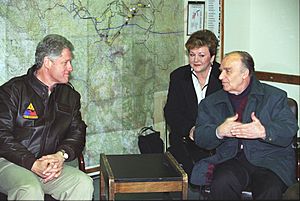Alija Izetbegović facts for kids
Quick facts for kids
Alija Izetbegović
|
|
|---|---|
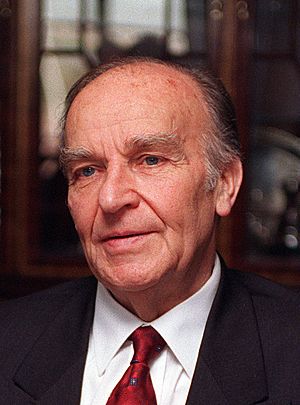
Izetbegović in March 1997
|
|
| 1st Chairman of the Presidency of Bosnia and Herzegovina | |
| In office 14 February 2000 – 14 October 2000 |
|
| Preceded by | Ante Jelavić |
| Succeeded by | Živko Radišić |
| In office 5 October 1996 – 13 October 1998 |
|
| Preceded by | Himself |
| Succeeded by | Živko Radišić |
| President of the Presidency of the Republic of Bosnia and Herzegovina | |
| In office 20 December 1990 – 5 October 1996 |
|
| Prime Minister | Jure Pelivan Mile Akmadžić Haris Silajdžić Hasan Muratović |
| Preceded by | Obrad Piljak (as President of the Presidency of SR Bosnia and Herzegovina) |
| Succeeded by | Himself (as Chairman of the Tripartite presidency) |
| 1st Bosniak Member of the Presidency of Bosnia and Herzegovina | |
| In office 20 December 1990 – 14 October 2000 |
|
| Preceded by | Office established |
| Succeeded by | Halid Genjac |
| President of the Party of Democratic Action | |
| In office 26 May 1990 – 13 October 2001 |
|
| Preceded by | Office established |
| Succeeded by | Sulejman Tihić |
| Personal details | |
| Born | 8 August 1925 Bosanski Šamac, Kingdom of Serbs, Croats and Slovenes |
| Died | 19 October 2003 (aged 78) Sarajevo, Bosnia and Herzegovina |
| Nationality | Bosnian |
| Political party | Party of Democratic Action |
| Spouse |
Halida Repovac
(m. 1949) |
| Children | 3, including Bakir |
| Profession | Politician, activist, lawyer, author, and philosopher |
| Awards | |
| Signature |  |
| Military service | |
| Allegiance | |
| Branch/service | Army of the Republic of Bosnia and Herzegovina |
| Years of service | 1992–1996 |
| Rank | Commander-in-chief |
| Commands | Army of the Republic of Bosnia and Herzegovina (supreme commander) |
| Battles/wars | Bosnian War Croat–Bosniak War |
Alija Izetbegović (8 August 1925 – 19 October 2003) was an important Bosnian politician, lawyer, and writer. In 1992, he became the first president of the newly independent Republic of Bosnia and Herzegovina. He held this role until 1996. After that, he served as a member of the country's Presidency of Bosnia and Herzegovina until 2000.
Izetbegović also founded the Party of Democratic Action, a major political party. He wrote several books, including Islam Between East and West and Islamic Declaration.
Contents
Growing Up and Learning
Alija Izetbegović was born on 8 August 1925 in Bosanski Šamac. He was one of five children. His family was well-known but had lost much of its wealth. They moved to Sarajevo in 1928, where Alija went to school.
In 1941, Izetbegović helped start a group called Young Muslims. This group focused on Islamic ideas. After World War II, he was arrested by the new communist government. He was sentenced to three years in prison in 1946. Before this, he had studied law at the University of Sarajevo. Even after his release, he stayed involved in political discussions.
Activist and Writer
In 1970, Izetbegović published a book called Islamic Declaration. In this book, he shared his ideas about how Islam, government, and society could work together. The government banned the book. He was accused of trying to create an "Islamically pure" Bosnia and Herzegovina.
The book suggested that an Islamic society should be based on religious values. This idea caused concern among non-Muslims in Bosnia. They worried it meant he wanted to create a religious state. Izetbegović later said that his ideas were just theories and not meant for Bosnia's specific situation. Still, his opponents often used parts of the book to criticize him.
Time in Prison
Izetbegović was first arrested in 1946. He spent a total of 8 years in prison for his involvement in groups that supported human rights and religious freedom.
In April 1983, Izetbegović and twelve other Bosniak activists were put on trial in Sarajevo. They were accused of working against the government and spreading ideas that were seen as hostile. Izetbegović was sentenced to fourteen years in prison. Many international human rights groups, like Amnesty International, criticized this trial. They said the charges were based on "communist propaganda" and that the accused had not used violence.
In May 1983, his sentence was reduced to twelve years. In 1988, as the communist government weakened, he was released after nearly five years. His health had suffered during his time in prison.
Starting a Political Career
As Yugoslavia began to change in the late 1980s, Izetbegović and other Bosniak activists formed a political party. This was the Party of Democratic Action (SDA) in 1989. This party mainly represented the Bosniak people. Other groups in Bosnia, like Serbs and Croats, also formed their own ethnic parties.
In the 1990 Bosnian general election, the SDA won the most votes. Izetbegović became the Chairman of the Presidency. This was a new role in the country's government.
Leading the Country (1990–2000)
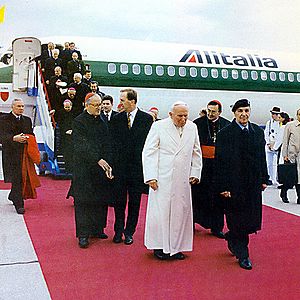
Bosnia and Herzegovina's government faced challenges as tensions grew in neighboring Croatia. Izetbegović wanted to keep Bosnia united and peaceful. He said he would "sacrifice peace for a sovereign Bosnia and Herzegovina." But he also stated he would not "sacrifice sovereignty" for peace. By early 1992, it was clear that different groups had very different goals. Bosniaks and Croats wanted an independent Bosnia. Serbs wanted it to stay part of Yugoslavia.
In January 1992, a plan was proposed to divide Bosnia into three ethnic regions. Izetbegović first agreed to this plan but later changed his mind. He decided against any division of Bosnia.
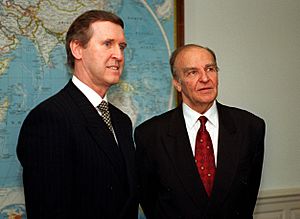
Izetbegović with U.S. Secretary of Defense William Cohen, 24 March 1997
|
The Bosnian War
In February 1992, Izetbegović called for a vote on Bosnia's independence. This was a condition for international recognition. Most Serbs boycotted the vote. However, 99.4% of those who voted chose independence. On 3 March, Izetbegović announced Bosnia's independence. The European Union and United States recognized the new country on 7 April 1992.
Soon after, the Bosnian War began. Serb forces attacked many areas. Izetbegović hoped that international forces would come to prevent war, but this did not happen. His government controlled only about 25% of the country. It mainly represented the Bosniak community.
During the war, Izetbegović lived in Sarajevo, which was under siege. He sought help from Muslim countries. The Bosnian government received money and weapons. Foreign Muslim volunteers also joined the Bosnian army. These volunteers were sometimes controversial.
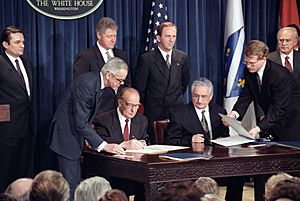
Ending the War
The Washington Agreement in March 1994 helped end the fighting between Bosniaks and Croats. It created the Federation of Bosnia and Herzegovina.
In August 1995, NATO launched air strikes against Bosnian Serb forces. This allowed Croatian and Bosniak forces to gain control of more territory. The war ended with a peace treaty negotiated in Dayton, Ohio. This agreement, known as the Dayton Agreement, was signed in November 1995. Izetbegović represented the Bosnian government in these talks.
After the War
After the war, Izetbegović became a member of the Presidency of Bosnia and Herzegovina. He stepped down in October 2000 at age 74 due to poor health. He remained popular with the Bosniak people, who called him Dedo, meaning "grandfather."
Death
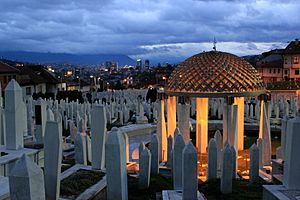
Alija Izetbegović passed away on 19 October 2003. He died from heart disease and injuries from a fall. His funeral was held on 22 October and was attended by many officials and thousands of people.
There were ideas to rename a street in Sarajevo and the Sarajevo International Airport after him. However, these ideas did not happen due to objections from various groups.
He had a son, Bakir, who also became a politician. On 11 August 2006, Izetbegović's grave was damaged by a bomb. The people responsible were never found.
Honors and Awards
Military Rank
| Award or decoration | |
|---|---|
 |
Commander-in-chief of the Bosnian Armed Forces |
International Awards
| Award or decoration | Country | Awarded by | Year | Place | |
|---|---|---|---|---|---|
| Grand Order of Queen Jelena | Franjo Tuđman | 1995 | Zagreb | ||
| Order of the State of Republic of Turkey | Süleyman Demirel | 1997 | Ankara | ||
| Order of Independence | Hamad bin Khalifa Al Thani | 1998 | Doha | ||
Writings
Available in English
- Islam Between East and West, Alija Ali Izetbegović, American Trust Publications, 1985 (also ABC Publications, 1993)
- Inescapable Questions: Autobiographical Notes, 'Alija Izetbegović, The Islamic Foundation, 2003
- Izetbegović of Bosnia and Herzegovina: Notes from Prison, 1983–1988, Alija Izetbegović, Greenwood Press, 2001
- Notes From Prison – 1983–1988
- The Islamic Declaration, Alija Izetbegović, s.n., 1991
Available in Bosnian
- Govori i pisma, Alija Izetbegović, SDA, 1994
- Rat i mir u Bosni i Hercegovini (Biblioteka Posebna izdanja), Alija Izetbegović, Vijece Kongresa bosnjackih intelektualaca, 1998
- Moj bijeg u slobodu: Biljeske iz zatvora 1983–1988 (Biblioteka Refleksi), Alija Izetbegović, Svjetlost, 1999
- Islamska deklaracija (Mala muslimanska biblioteka), Alija Izetbegović, Bosna, 1990
See Also
 In Spanish: Alija Izetbegović para niños
In Spanish: Alija Izetbegović para niños
Images for kids
 | Jewel Prestage |
 | Ella Baker |
 | Fannie Lou Hamer |


